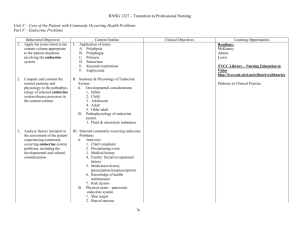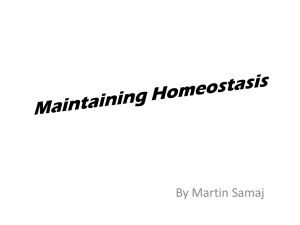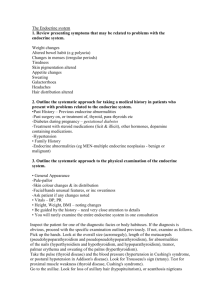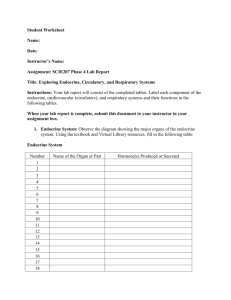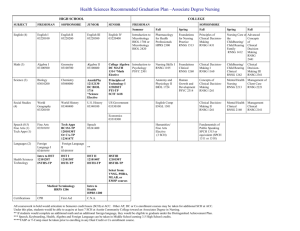Care of the Client Experiencing Problems with the Endocrine System
advertisement
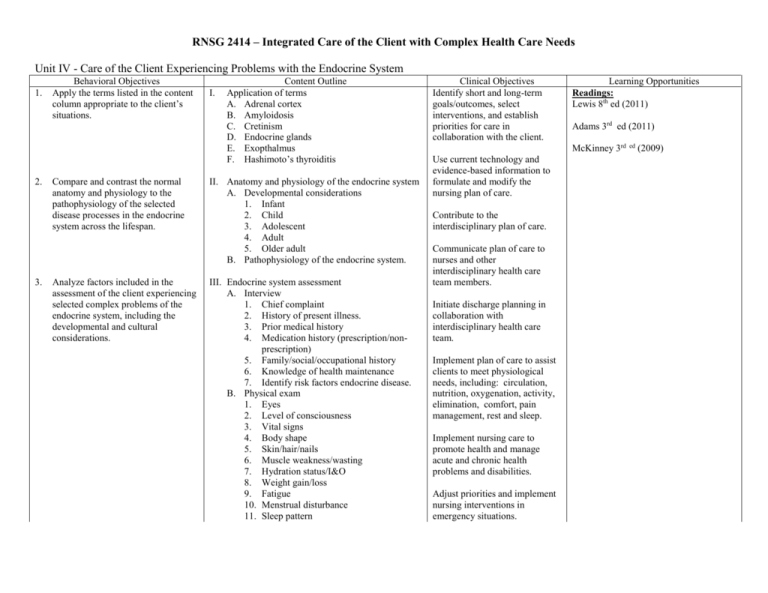
RNSG 2414 – Integrated Care of the Client with Complex Health Care Needs Unit IV - Care of the Client Experiencing Problems with the Endocrine System 1. 2. 3. Behavioral Objectives Apply the terms listed in the content column appropriate to the client’s situations. Compare and contrast the normal anatomy and physiology to the pathophysiology of the selected disease processes in the endocrine system across the lifespan. Analyze factors included in the assessment of the client experiencing selected complex problems of the endocrine system, including the developmental and cultural considerations. I. Content Outline Application of terms A. Adrenal cortex B. Amyloidosis C. Cretinism D. Endocrine glands E. Exopthalmus F. Hashimoto’s thyroiditis II. Anatomy and physiology of the endocrine system A. Developmental considerations 1. Infant 2. Child 3. Adolescent 4. Adult 5. Older adult B. Pathophysiology of the endocrine system. III. Endocrine system assessment A. Interview 1. Chief complaint 2. History of present illness. 3. Prior medical history 4. Medication history (prescription/nonprescription) 5. Family/social/occupational history 6. Knowledge of health maintenance 7. Identify risk factors endocrine disease. B. Physical exam 1. Eyes 2. Level of consciousness 3. Vital signs 4. Body shape 5. Skin/hair/nails 6. Muscle weakness/wasting 7. Hydration status/I&O 8. Weight gain/loss 9. Fatigue 10. Menstrual disturbance 11. Sleep pattern Clinical Objectives Identify short and long-term goals/outcomes, select interventions, and establish priorities for care in collaboration with the client. Learning Opportunities Readings: Lewis 8th ed (2011) Adams 3rd ed (2011) McKinney 3rd Use current technology and evidence-based information to formulate and modify the nursing plan of care. Contribute to the interdisciplinary plan of care. Communicate plan of care to nurses and other interdisciplinary health care team members. Initiate discharge planning in collaboration with interdisciplinary health care team. Implement plan of care to assist clients to meet physiological needs, including: circulation, nutrition, oxygenation, activity, elimination, comfort, pain management, rest and sleep. Implement nursing care to promote health and manage acute and chronic health problems and disabilities. Adjust priorities and implement nursing interventions in emergency situations. ed (2009) RNSG 2414 – Integrated Care of the Client with Complex Health Care Needs Unit IV - Care of the Client Experiencing Problems with the Endocrine System Behavioral Objectives Content Outline 12. Respiratory status 13. Bowels C. Diagnostic tests 1. Radiology a. Thyroid scan b. Radioactive iodine uptake c. Computerized axial tomography (CT) d. Magnetic resonance imaging (MRI) e. Sonogram 2. Laboratory studies a. Serum T4 b. Serum T3 c. T3 resin uptake d. Thyroid Stimulating Hormone (TSH) e. Cholesterol f. Muscle enzymes 1) ALT 2) SGPT 3) LDH 4) CK g. Urine osmolality h. Urinalysis i. Electrolytes j. Blood glucose k. White blood cell count (WBC) l. Cortisol m. 17 hydroxycorticosteroids n. ACTH stimulation o. Dexamethasone suppression p. 17 ketosteroids q. ACTH radioimmunassay r. Renin level 3. Other a. Achilles tendon reflex b. ECG c. Fluid Challenge Test D. Cultural influences Clinical Objectives Learning Opportunities RNSG 2414 – Integrated Care of the Client with Complex Health Care Needs Unit IV - Care of the Client Experiencing Problems with the Endocrine System Behavioral Objectives Content Outline 1. Hereditary 2. Environmental 3. Health beliefs/practices E. Developmental 1. Age specific assessment data a. Muscle tone b. Vital signs c. Fluid/electrolytes d. Height, body structure e. Nutritional 2. Behavioral/emotional response to health care providers 4. Differentiate between the etiology, pathophysiology, and clinical manifestations of selected complex endocrine problems. IV. Selected complex endocrine problems A. Thyroid 1. Hyperthyroid 2. Hypothyroid B. Diabetes insipidus C. Syndrome of Inappropriate Diuretic Hormones (SIADH) D. Addison’s disease E. Cushing’s disease 5. Discuss analysis, planning implementation and evaluation for the nursing management of clients with selected complex endocrine problems. V. Selected nursing diagnoses/implementation/ evaluation A. Altered thought processes 1. Independent interventions a. Level of awareness assessment b. Age related hydration status c. Intake & output d. Monitor pertinent diagnostic tests e. Maintain skin integrity f. Orient to time, place, date and events g. Provide appropriate stimulation h. Teach about change in cognitive processes i. Fall/safety precautions 2. Collaborative interventions Clinical Objectives Learning Opportunities RNSG 2414 – Integrated Care of the Client with Complex Health Care Needs Unit IV - Care of the Client Experiencing Problems with the Endocrine System Behavioral Objectives Content Outline Administer replacement fluids 1) Oral 2) IV b. Administer medications and monitor for desired effects/adverse/side effects/drug interactions 1) Thyroid hormones 2) Antithyroid 3) Beta adrenergic blocking agents 4) Steroids 5) Radioactive iodine 6) Anti-diuretic hormone 7) Thiazide diuretics c. Restraints 3. Recognition of complications a. Excessive vasoconstriction b. Chronic rhinopharyngitis c. Lipodystrophy d. Dehydration e. Addisonian crisis f. Coma/death g. Psychosis h. Osteoporosis i. Peptic ulcer j. Pancreatitis k. Hypertension l. Shock m. Metabolic alkalosis n. Impotence o. Sepsis/infection p. Impaired wound healing q. Body changes r. Skin/hair/nail changes s. Dysrhythmias t. Depression u. Hallucinations v. Thyrotoxic crisis w. Iodism 4. The client will have improved thought a. Clinical Objectives Learning Opportunities RNSG 2414 – Integrated Care of the Client with Complex Health Care Needs Unit IV - Care of the Client Experiencing Problems with the Endocrine System Behavioral Objectives Content Outline processes as evidenced by: a. Oriented to person, place, time and events b. Demonstrate no sign and symptoms of dehydration c. Improved laboratory studies d. Stable vital signs B. High risk for postop complications 1. Surgical modalities a. Adrenalectomy b. Thyroidectomy c. Intra-cranial surgery 1) Transsphenoidal hypophysectomy 2. Independent interventions a. Review all pertinent assessments b. Nasal care/precautions c. I&O d. Vital signs e. Antiembolic stockings f. Ankle exercises; ROM g. Monitor IV/site care h. Position appropriate for surgery i. Wound assessment/care j. See NCP for pain k. Encourage activity as tolerated l. Deep breathing m. Safety considerations n. Monitor lab values o. Report unexpected observations p. Observe for thyroid crisis 3. Collaborative interventions a. Administer medications and monitor for desired/effects/adverse effects/side effects 1) Antibiotics 2) Narcotics 3) Pain medication b. Recognition of complications Clinical Objectives Learning Opportunities RNSG 2414 – Integrated Care of the Client with Complex Health Care Needs Unit IV - Care of the Client Experiencing Problems with the Endocrine System Behavioral Objectives c. d. N:Spring\RNSG 2414 Unit IV-Endocrine System Content Outline 1) Hemorrhage 2) Infection/wound and systemic 3) Addisonian crisis 4) Delayed wound healing 5) Thyroid storm Community resources 1) Home Health The client will not experience postop complications as evidenced by: 1) Wound healing 2) Vital signs 3) Tolerates diet 4) Laboratory studies 5) No signs/symptoms of cortisone deficit Clinical Objectives Learning Opportunities Reviewed 06/11
